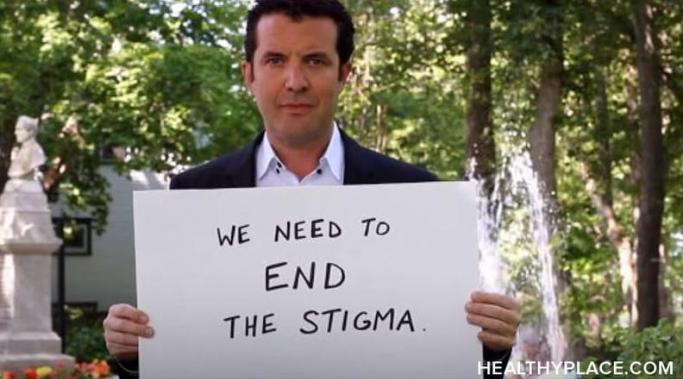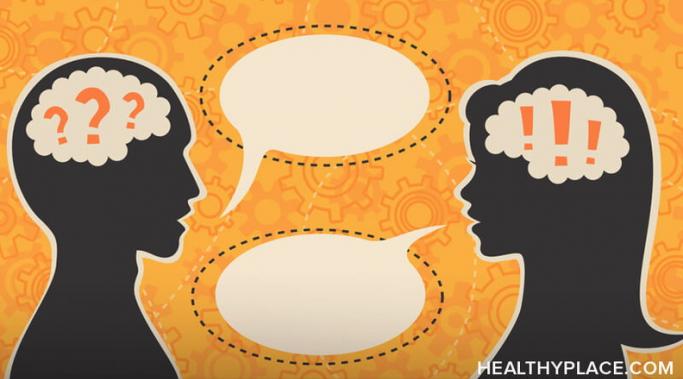The phrase “get over it” is something the mental health community has heard and spoken out against many times (What Is Stigma?). In particular, we hear it applied to depression and anxiety, but likely because those are the two mental illnesses that are most spoken about. The problem is, even though we’ve discussed the phrase and the problems it presents, it’s still something we hear over and over again, which, to me, means it’s something we need to continue speaking out against. "Get over it" just isn't helpful advice for a person with a mental illness.
Surviving Mental Health Stigma
When a parent is affected by mental health stigma, there are unique problems that occur (Issues for Parents With Mental Illness). These difficulties can range from a neighbor or friend commenting on your fitness of being a parent while living with a mental health issue, to having to battle for your children during a divorce hearing, or even facing losing your children as a result of a breakdown. The important thing to remember is when you are a parent affected by mental health stigma, there is always hope and you have to focus on getting yourself better first.
Sometimes, mental illness stigma comes from a loved one's concern for us but mental illness stigma that comes from concern still hurts. For example, I don’t talk about the period of time in my life when I was suicidal. On the rare occasion I might, it will be a fleeting comment or a quick attempt to brush it off as if it were nothing. Even in the articles I’ve written about it, it’s more to talk about how it worked (the way the idea was stuck on repeat in my head; the way it drowned out all other options) rather than the way it actually impacted me. I wish my loved ones didn't react out of concern for me. When they do, I feel as if I must explain myself instead of just talking out the problem. Their concern shows mental illness stigma.
Mental illness stigma and when to be honest in a relationship is tricky business. Being in a relationship when you have a mental illness can often make the difference between feeling good about yourself and feeling as though life has no meaning. Unfortunately, sometimes being honest about mental illness in a relationships causes people who believe in the stigma to leave.
Sometimes even mental health advocates suffer self-stigma. There’s a lot more to advocacy than meets the eye (It's Critical to Be an Advocate for Those With Mental Illness). It’s not just standing up and saying or writing some words and expecting everyone to believe it – it’s about living the words, too. The challenge that comes with being a mental health advocate is that it creates an image or expectation of how people will see you. A mental health advocate's self-stigma can be a problem.
It's hard to overcome stigma and judgement but you can overcome the stigma of mental illness with peer and family support. Just about everyone who suffers from a mental illness has experienced some form of mental health stigma. Stigma can take many forms, but for the sake of this blog post, I want to focus on the type of stigma that causes others to judge people with a mental illness and lower the status of mentally ill people in social situations.
When others judge you, it affects whether they will choose to befriend you, whether they will give you the respect you are due as a human being, and it affects many different social advantages that people without mental illnesses take for granted. But you can overcome the stigma of judgement of mental illness with support.
There’s a video that came out just over a month ago that tells me to stop saying I'm depressed. It was made and posted by Prince Ea (Discussing Depression and Mental Health: Why Language Matters). Despite his enormous Facebook following, I had never heard of him before this video, but from what I can tell, he is a motivational speaker. His large following and the viral traction the video gained are the reason I want to write about it. You see, Prince Ea's message is fundamentally flawed. It tells me to stop saying I'm depressed.
Stigma, as defined at dictionary.com is a mark of disgrace or infamy. Not all stigma is from others; sometimes stigma comes from within. When a person is ashamed because they have a mental illness of just about any kind, often because of negative opinions of others, they may try to hide their problem and not seek proper treatment. This effect is known as self-stigma and can be a barrier to relationships, employment, and especially proper mental health treatment.
The stigma of talking about mental illness shows itself in mental health conversations and proves again and again to be a double-edged sword. On the one side, there is the potential to help many people who are otherwise left in the dark and suffering in silence. Talking about mental illness can also bring awareness to people who had stigma-driven ideas of what mental health is and change their minds. Essentially, talking about mental illnesses can slice through the negative and bring about positive change (Stop Minimizing Mental Illness: Worst Things to Say). That same sword is also often used to parry against the truth of mental illness. Some people just don’t get it (and don't want to get it). They keep the ignorance of mental illness alive by talking about mental illnesses incorrectly. There can be stigma in talking about mental illness.
Hi, my name is Leif Gregersen and I am excited to be starting a new position as your mental health blogger on the Surviving Mental Health Stigma blog. I was diagnosed with a mental illness at the young age of 14 and was bullied and ashamed of my condition. I remember having a very difficult time returning to school after a hospitalization and convincing my dad that I didn’t need pills. As a result, over the next four years, I became much sicker and my life only got worse. It is my hope that I can help people to have a better understanding of mental illness and overcome stigma. I strongly feel this is an essential step in recovery.









